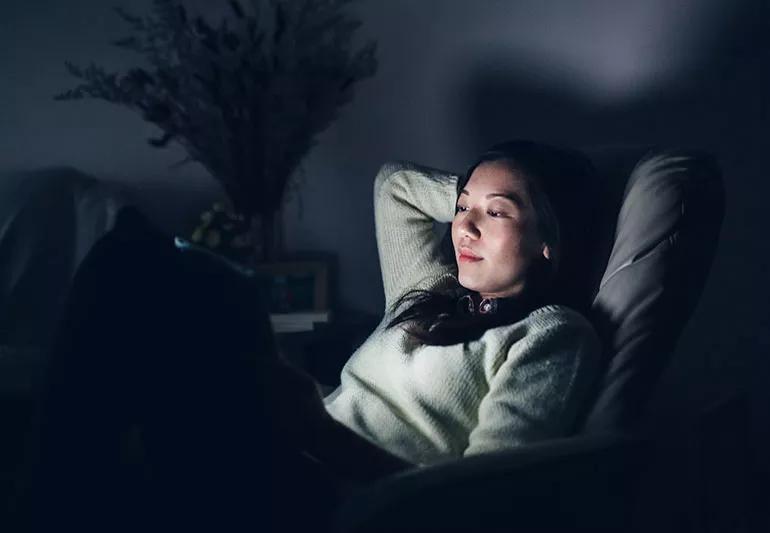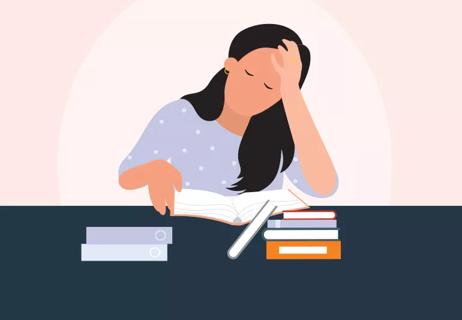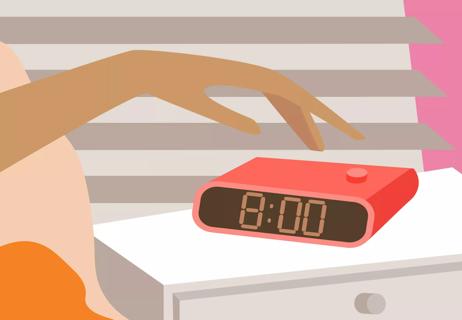Find out where you could be going wrong and how to get back to sleep

We’ve all had rough nights. They might have started when you drifted off to sleep, only to wake up and never get back to your ZZZs. Or maybe you tossed, turned and watched the clock until the sun came up. But some people don’t just have rough nights here and there. They might struggle for weeks or even months. Once it gets to either of these points, they’re up against a tough opponent — insomnia.
Advertisement
Cleveland Clinic is a non-profit academic medical center. Advertising on our site helps support our mission. We do not endorse non-Cleveland Clinic products or services. Policy
Battling insomnia isn’t an easy thing. And while you might think you’re managing it the right way, you could be doing things that can make the situation even worse.
Behavioral sleep medicine psychologist Alicia Roth, PhD, explains what insomnia is and how some of our habits could be keeping us from getting the sleep that our bodies truly need.
Insomnia comes in two major forms. “Insomnia is when someone has problems falling asleep, staying asleep or both most nights of the week. If you experience this for less than three months, it’s acute insomnia. If it’s been more than three months, you’re dealing with chronic insomnia,” says Dr. Roth. She adds that either form can affect how people perform during the day.
According to Dr. Roth, anything can trigger insomnia and it doesn’t necessarily have to be negative.
“It can be a traumatic event, a mental health problem, a medical problem, a stressful life event — but it doesn’t even have to be something bad. It can be a good thing that just represents change, like starting a new job, moving or anything that disrupts your normal life.”
You might think if you have a bad night, you can bounce back by getting more sleep or guzzling energy drinks to make it through the day. Unfortunately, you end up making things tougher on yourself.
Advertisement
“It’s painful to be sleep deprived. As humans, we do not sit well with discomfort. We are not wired to be uncomfortable. So, our brains will start running through what we can do to relieve the discomfort,” says Dr. Roth.
“You might think, ‘I can’t take a nap because I’m still working. I can’t go outside because I’m still working.’ At this point, you only have a couple of options to relieve discomfort. One might be reaching for another cup of coffee,” says Dr. Roth.
That afternoon coffee might seem like a great way to get the boost you need. However, it can make things tougher when it’s time to go to sleep.
“You’re only sabotaging yourself for that night’s sleep. And if you keep doing this, you can get caught in a vicious cycle of not sleeping well.”
According to Dr. Roth, other things that can come back to haunt you around bedtime are napping during the day, sleeping in on weekends or spending too much time in bed.
“If you have a bad night of sleep, one of your instincts might be to go to bed early the next night. You’re exhausted, and again, sleep deprivation is painful. But spending more time in bed does not buy you more sleep,” Dr. Roth explains.
A trap that people with insomnia often get into is thinking, “I’m going to spend as much time as possible in my bed because that’s going to give me the best chance to sleep.” Dr. Roth says you may end up going to sleep early and falling asleep quickly, but you might not be able to stay asleep — and then you may struggle to get back to sleep.
When you’re having trouble sleeping night after night, you’re bound to start dreading bedtime before it even rolls around. The expectation of not being able to sleep, and the anxiety that stems from it, can also keep you in a constant loop of restlessness.
“Anxiety can become a vicious cycle. You’re not sleeping well, so you feel worried about your sleep and anxious about the next day. You might wonder if you’re going to be able to function or if you’re going to be able to stay awake. And all of that anxiety affects the next night of sleep,” says Dr. Roth.
Dr. Roth specializes in behavioral sleep medicine. She says that while it’s a highly effective way to treat insomnia, not too many people are aware that it exists. It can also be hard to gain access to it.
“For insomnia, the goal is to help patients through behavior modification instead of simply relying on medication. In some cases, behavior modification can help people manage their insomnia in addition to medication. It’s the gold standard for treatment, but it can be difficult to access.”
Doctors will often refer patients who are struggling with insomnia to behavioral sleep medicine psychologists. Some of these patients might even be on medications that stopped working a while ago.
Advertisement
Dr. Roth says that sleep medications are designed for short-term use. They work well for short bouts of insomnia, like if you’re dealing with something stressful like a hospital stay or having a mental health crisis.
“Short-term sleep medications work well for short periods of time — but I rarely see them used like that. Most of the time, patients have used them for months or years not realizing these medicines lose their effectiveness,” she says.
Over time, these medications lose the ability to sedate you. That’s one of the reasons why healthcare providers are moving away from medications — they’re just not designed to be long-term. The other issue is you may start to develop a psychological dependence on medications, Dr. Roth says.
This dependence is formed when someone starts to feel like they can’t sleep unless they take medication. Dr. Roth might work with a patient to help them get off of sleep medication completely, or she can help them develop more confidence and good habits that can ease insomnia right along with the medication they’re currently on.
“When you have insomnia, you don’t know what to expect. That can cause a lot of anxiety because you don’t have any confidence about what the night holds for you,” she says.
Advertisement
“A lot of what I do with patients involves building their confidence when it comes to sleep and ensuring they have reasonable, realistic expectations about what’s going to happen. If they can predict what’s going to happen, they can feel more confident about sleeping. Sometimes that confidence is bottled up in a pill. My job is to teach them how to do that on their own.”
Dr. Roth says having a bedtime routine is key to calming your insomnia.
She says your body and your mind love predictability in lots of different contexts in your life, including sleep.
“Your body and your mind like to predict the environment — what you’re wearing, the temperature of the room, what your bed and sheets feel like, what your bed smells like. And all of these things make a difference because you’ve become conditioned to certain sensations, feelings and routines. If your body and your mind can predict when and where sleep is supposed to happen, you can set yourself up for a good night of sleep.”
We all remember our childhood bedtime routines — baths, teeth brushing and our favorite TV show or book before it was time for some shut-eye. That routine told us that it was time to unwind from the day’s events. If you have kids, you probably have a similar routine. Dr. Roth strongly suggests developing a bedtime routine of your own if you don’t have one to help your body and mind relax.
Advertisement
“Even though you’re an adult, if you get into a routine of taking a shower or reading a book and then going to bed, eventually, your body’s going to recognize that these habits mean sleep isn’t far behind.”
She says the routine might vary from person to person, but just having predictability and consistency in what you’re doing before bed, and what your bedroom environment is like can be sleep-promoting.
Having comfortable sheets, pillows, pajamas and even an ideal room temperature can all help you sleep better. Dr. Roth explains.
“It’s really about your comfort. You want to make sure that your mattress, pillows, sheets and pajamas are comfortable for you,” she says.
Research has shown that a cooler temperature in the bedroom is helpful for sleep. “Your internal body temperature drops while you sleep, so sleeping in a cool environment is good. Taking a hot bath or a hot shower before bedtime can also be helpful,” says Dr. Roth.
“If you transition from being in a hot place to getting ready to sleep in a cool room, you’re kind of exaggerating the effects of cooling down and this can help people fall asleep.”
Dr. Roth recommends not exercising or consuming nicotine or alcohol within the two-hour window before bedtime. She says that exercise is great for helping you sleep, so you shouldn’t avoid it if you’re struggling with insomnia. But try not to get revved up right before you plan to retire for the night.
The timing of food is important. You don’t want to go to bed starving, but you also don’t want to have a heavy meal before bedtime.
“Not having heavy meals two hours before bedtime is a good rule. Just make sure that you’re eating throughout the day and that you’re eating healthy food. Because when your eating schedule is off, it can throw your sleep schedule off,” she says.
Staying in bed will only make things worse because you’re agitated, stressed out and telling your brain that your peaceful bed is an annoying, uncomfortable place.
Dr. Roth recommends getting up and doing something relaxing. You can read, write, fold clothes or even take a bath. Do whatever you’d like as long as that activity is calming and not stressful.
If you think getting ahead on the workday at 2 a.m. is a brilliant idea, think again. Also, keep in mind that the activity you choose is not supposed to put you to sleep. It’s supposed to help your mind and body relax so you’re ready to go back to sleep.
Learn more about our editorial process.
Advertisement

Pain, light exposure and anxiety are just a few factors that could be waking you up in the middle of the night

Create a consistent wake-up schedule, don’t nap too long and follow the ‘20-minute toss-and-turn rule’ when you can’t sleep

If you’re feeling short of breath, sleep can be tough — propping yourself up or sleeping on your side may help

Changing hormones, mental health issues and a higher risk for sleep disorders can all impact women’s sleep needs

Keeping a sleep diary and seeing a sleep specialist can help you stay asleep and get the ZZZs you need

This social media sleep hack with tart cherry juice and magnesium could be worth a try

Sleep disorders, diet and mental health can affect the quality of your sleep

It’s normal to oversleep occasionally, but sometimes, there might be an underlying cause

If you’re feeling short of breath, sleep can be tough — propping yourself up or sleeping on your side may help

If you fear the unknown or find yourself needing reassurance often, you may identify with this attachment style

If you’re looking to boost your gut health, it’s better to get fiber from whole foods